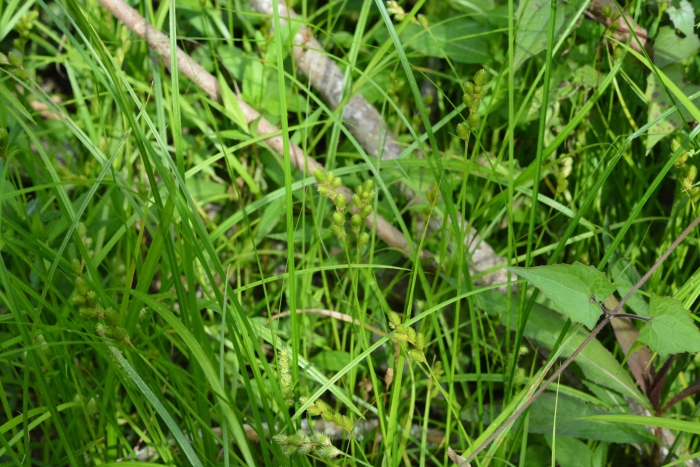Blunt Broom Sedge
(Carex tribuloides)
Blunt Broom Sedge (Carex tribuloides)
/
/

Amber M. King
CC BY 4.0
Image By:
Amber M. King
Recorded By:
Copyright:
CC BY 4.0
Copyright Notice:
Photo by: Amber M. King | License Type: CC BY 4.0 | License URL: http://creativecommons.org/licenses/by/4.0/ | Rights Holder: Amber M. King | Publisher: iNaturalist | Date Created: 2021-05-01T09:59:03-07:00 |




























Estimated Native Range
Summary
Carex tribuloides, commonly known as Blunt Broom Sedge, is a semi-deciduous perennial grass native to wet meadows, marshes, and along stream banks in the Eastern and Central USA, as well as Ontario. It typically grows to a height of 2-3 feet (0.6-0.9 meters) and can spread to about 3 feet (0.9 meters) wide. This sedge forms dense clumps of narrow, arching leaves, and its flowering stems bear inconspicuous greenish-brown flowers in late spring to summer. The plant’s foliage may remain partly green in mild winters.
Blunt Broom Sedge is valued for its ability to stabilize soil and its use in rain gardens or naturalized areas where its adaptability to wet conditions is beneficial. It is also used for erosion control along waterways. In cultivation, it prefers full sun to part shade and requires medium amounts of water, thriving in soils with medium to slow drainage. While it is not known for showy flowers, its texture and form contribute to its aesthetic appeal in a garden setting. Carex tribuloides is relatively low maintenance but can spread vigorously, sometimes becoming aggressive in ideal conditions. It is not typically plagued by serious pests or diseases.CC BY-SA 4.0
Blunt Broom Sedge is valued for its ability to stabilize soil and its use in rain gardens or naturalized areas where its adaptability to wet conditions is beneficial. It is also used for erosion control along waterways. In cultivation, it prefers full sun to part shade and requires medium amounts of water, thriving in soils with medium to slow drainage. While it is not known for showy flowers, its texture and form contribute to its aesthetic appeal in a garden setting. Carex tribuloides is relatively low maintenance but can spread vigorously, sometimes becoming aggressive in ideal conditions. It is not typically plagued by serious pests or diseases.CC BY-SA 4.0
Plant Description
- Plant Type: Grass
- Height: 1.5-3 feet
- Width: 2-3 feet
- Growth Rate: Slow
- Flower Color: N/A
- Flowering Season: Spring
- Leaf Retention: Semi-Deciduous
Growth Requirements
- Sun: Full Sun, Part Shade
- Water: Medium
- Drainage: Medium, Slow
Common Uses
Bird Garden, Deer Resistant, Low Maintenance, Water Garden
Natural Habitat
Wet meadows, marshes, and along stream banks
Other Names
Common Names: Awl-Fruited Oval Sedge, Carex Tribuloïde, Kanadastarr
Scientific Names: , Carex tribuloides, Carex tribuloides subsp. tribuloides,
GBIF Accepted Name: Carex tribuloides Wahlenb.